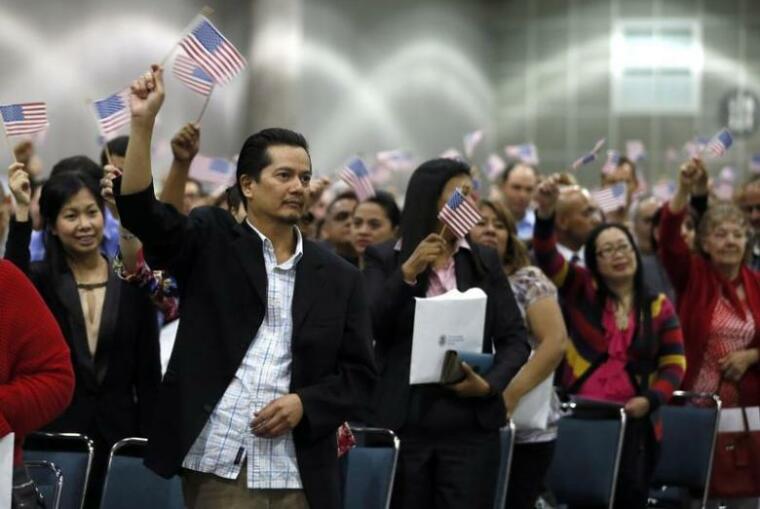Immigrant seeks removal of 'So Help Me God' from US citizenship oath

A French national who wants to become an American citizen has filed a lawsuit against the U.S. government on Thursday in an attempt to remove the phrase "so help me God" from the citizenship oath.
Olga Paule Perrier-Bilbo, an atheist and a resident of Scituate, Massachusetts, claimed that her wish to become a U.S. citizen is being denied because she is required to recite the said phrase.
"By its very nature, an oath that concludes 'so help me God' is asserting that God exists," Perrier-Bilbo's lawsuit stated, according to MassLive.com.
"Accordingly, the current oath violates the first 10 words of the Bill of Rights, and to participate in a ceremony which violates that key portion of the United States Constitution is not supporting or defending the Constitution as the oath demands," it continued.
Perrier-Bilbo, who was issued a green card in 2004, has been allowed to recite a modified oath or participate in a private citizenship ceremony, but she contended that the presence of "so help me God" is still an unconstitutional government endorsement of religion. She further argued that the alternatives offered to her by the government place an illegal burden on her for her beliefs.
"By placing a religious statement (to which Plaintiff does not adhere) into the Oath of Naturalization, and then forcing Plaintiff to use an alternative oath (so that she must feel less than a new citizen), Defendants substantially burden Plaintiff in her exercise of religion," the lawsuit further stated.
Atheists and civil liberties organizations have brought numerous cases challenging alleged government endorsement of religion.
In December 2016, a federal court dismissed a lawsuit that seeks to remove the phrase "In God We Trust" from the U.S. currency.
Judge Benita Pearson, who was appointed to the bench by former President Barack Obama, argued that the plaintiffs were not able to demonstrate that the use of the motto on currency places a substantial burden on their religious exercise.
She further noted that the government does not require its citizens to display money, adding that the currency does not exist for the specific purpose of being observed or read by the public.
In 2000, Michael Newdow filed a lawsuit against his child's school district in an effort to remove the words "under God" from the Pledge of Allegiance.
He argued that the recital of the pledge violated the Establishment clause, but the Supreme Court ruled that he did not have the standing to sue, and a federal appeals court later ruled that a teacher leading students in the pledge did not violate the First Amendment. Newdow, a California attorney, is one of the lawyers representing Perrier-Bilbo in her case.
Erwin Chemerinsky, the dean of Berkeley law and an expert on the First Amendment, said that Newdow's defeat in the Pledge of Allegiance case could be an indication of the difficulties that Perrier-Bilbo would face in her lawsuit.
"Courts generally have not been receptive to this in the context of the Pledge of Allegiance," Chemerinsky stated in an email.
 Christians don't have to affirm transgenderism, but they can’t express that view at work: tribunal
Christians don't have to affirm transgenderism, but they can’t express that view at work: tribunal Archaeology discovery: Medieval Christian prayer beads found on Holy Island
Archaeology discovery: Medieval Christian prayer beads found on Holy Island Presbyterian Church in America votes to leave National Association of Evangelicals
Presbyterian Church in America votes to leave National Association of Evangelicals Over 50 killed in 'vile and satanic' attack at Nigerian church on Pentecost Sunday
Over 50 killed in 'vile and satanic' attack at Nigerian church on Pentecost Sunday Ukrainian Orthodox Church severs ties with Moscow over Patriarch Kirill's support for Putin's war
Ukrainian Orthodox Church severs ties with Moscow over Patriarch Kirill's support for Putin's war Islamic State kills 20 Nigerian Christians as revenge for US airstrike
Islamic State kills 20 Nigerian Christians as revenge for US airstrike Man who served 33 years in prison for murder leads inmates to Christ
Man who served 33 years in prison for murder leads inmates to Christ


 Nigerian student beaten to death, body burned over ‘blasphemous’ WhatsApp message
Nigerian student beaten to death, body burned over ‘blasphemous’ WhatsApp message 'A new low': World reacts after Hong Kong arrests 90-year-old Cardinal Joseph Zen
'A new low': World reacts after Hong Kong arrests 90-year-old Cardinal Joseph Zen Iran sentences Christian man to 10 years in prison for hosting house church worship gathering
Iran sentences Christian man to 10 years in prison for hosting house church worship gathering French Guyana: Pastor shot dead, church set on fire after meeting delegation of Evangelicals
French Guyana: Pastor shot dead, church set on fire after meeting delegation of Evangelicals ‘Talking Jesus’ report finds only 6% of UK adults identify as practicing Christians
‘Talking Jesus’ report finds only 6% of UK adults identify as practicing Christians Mission Eurasia ministry center blown up in Ukraine, hundreds of Bibles destroyed: 'God will provide'
Mission Eurasia ministry center blown up in Ukraine, hundreds of Bibles destroyed: 'God will provide' Church holds service for first time after ISIS desecrated it 8 years ago
Church holds service for first time after ISIS desecrated it 8 years ago Burger King apologizes for 'offensive campaign' using Jesus' words at the Last Supper
Burger King apologizes for 'offensive campaign' using Jesus' words at the Last Supper Uganda: Muslims abduct teacher, burn him inside mosque for praying in Christ’s name
Uganda: Muslims abduct teacher, burn him inside mosque for praying in Christ’s name